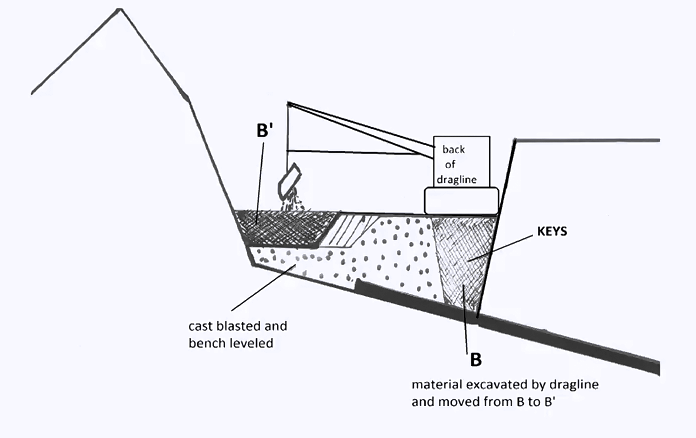How Excavator can Save You Time, Stress, and Money.
Wiki Article
Excavator Fundamentals Explained
Table of ContentsThe Main Principles Of Excavator The Ultimate Guide To General ContractorHow Excavation Contractors Near Me can Save You Time, Stress, and Money.Unknown Facts About Excavation CompaniesUnknown Facts About Trencher


Scrapers or Pans excavate soil in one area, haul and also unload the dirt in one more place (trencher). It is hard to match the efficiency of scrapes for cut/fill soil operation if the haul range is less after that a mile. Scrapes are usually pulled by a rubber tire wheel tractor and also are in some cases pushed with the cut location by an excavator.
There are often times that scrapers are not used for website grading and a dump truck is used: the haul might be to long, the haul might cross roadways where scrapes are not permitted, difficult rock might be experienced, tools availability, etc. Unload vehicles are in common use and most likely call for little conversation.
Many vehicles have a top-hinged tailgate that can not dump any type of rock broader after that the tailgate size. "Rock body" beds, on the various other hand, have no tailgates and can discard any kind of size rock, although their quantity capacity is lessened. These web links show tools specs for numerous usual dump trucks. Compaction Equipment increases the thickness of the soil and in many cases provides a smooth, rolled surface.
Fascination About Demolition
From an easy test pit to percussion exploration to core exploration the owner has increasingly extra costly options that yield increasingly better data regarding the website underground. The Owner on a 100,000 SF building job may license twenty monotonous places with split spoon soil samples taken till rock is reached as well as then core samples of rock.Understanding the kind and also high quality of rock (from the core samples) and also place of rock (from the soils boring) is a genuine advantage in jobsite preparation. On the other hand, the Owner of a 100,000 SF structure might decide to wage no geotechnical testing whatsoever. The decision regarding geotechnical testing is typically made by a Proprietor with no input from the Building Supervisor.
The section on Soils and also Geology assists you comprehend the terms in the geotechnical report. An expertise of the approximate place of the rock aids the Building and construction Manager to intend the sequence of actions complying with rock excavation. If rock remains in one edge of a huge building task, as an example, the earth excavation can begin at the opposite end of the structure in order to start foundation work soonest.
Starting the foundation job early would be a good concept if the rock can be eliminated by tearing. Nevertheless, if the rock is exceptionally hard as well as calls for significant blasting, it may be prudent to hold structure job up until the blasting is finished. The Building and construction Supervisor need to collaborate these kinds of choices as well as use all the technological day readily available.
Excavating Contractors - Questions
Unidentified excavation states that all rock or various other unforeseen materials (leaving out unsafe materials) encountered in the sitework will certainly be the duty of the Service provider at browse around these guys no adjustment in agreement price. An unidentified excavation is less complex from a book-keeping perspective as well as puts the obligation for geotechnical conditions onto the Sitework Service provider.It's outstanding what a heavy rain can do to a building and construction job. Prior to the rain, the website might be completely dry, hefty tools efficiently moving planet, the other professions efficiently performing their job.
In most locations of the world, the Construction Supervisor have to keep in mind a simple truth: IT WILL RAIN. Good planning can decrease the damage as well as interruption of a heavy rain to a jobsite. Often the excavation and also grading is entrusted to the Sitework Contractor (and their Foremen is liable to monitor and guide the hefty equipment as well as operators).
The Building Supervisor must be continuously mindful of what rainfall will certainly do to the job site. It is not unusual for the Sitework Supervisor to work their hefty devices for maximum efficiency and hope it does not rainfall. One of the most effective ways to get ready for rain is to slope all qualities to drain pipes and also to smooth rolled the surface area prior to a rain.
The Ultimate Guide To General Contractor
The Construction Manager need to be discerning sufficient to insure that hefty rainfall does not quit working on the task much longer than required. Daily discussions with Sitework Foremen may be needed to attain this objective. At any time excavation is called for listed below the existing aquifer on a project, the process of dewatering must be thought about.In a truly cohesive soil, the water travels so slowly via the clay or silt that dewatering is not generally needed for the relatively brief time of excavation. Dewatering might be required for a solitary ground excavation or for a whole task website. One of the most usual dewatering methods are trench drains, deep wells and well points.

Ground water infiltration can also be reduced by cutoff approaches such as sheet loading. The costs for dewatering can be staggering, including tools service, labor as well as electrical energy (or gas). High dewatering expenses have actually paled the revenue margins on far a lot of jobs. The lots of variables listed here make the work of approximating dewatering expenses very difficult, and really inexact.
This alternative must always be thought about when analyzing the prospect of dewatering. Obviously the option is just viable if gravity can run the water to reduced ground. Trench drains pipes can be reduced with a backhoe as well as loaded with a crude, granular material (# 4 stone for example), but treatment has to be exercised in selecting the water outlet kind as well as location.
The smart Trick of Excavating Contractors That Nobody is Talking About
A siphon, by meaning, makes use of climatic pressure to bring water from one altitude, up over a challenge, to a lower elevation. The pipelines in a siphon system have to be airtight as well as some resourcefulness is usually needed to totally load the siphon pipeline. The siphon pipe must be full for the siphon to start.A deep well is composed of a pump, hose pipe as well as a vertical well casing. The pump intake is at the base of the well housing (typically some smashed rock about his is put there as a filter tool) (excavation companies). The water is pumped up the hose pipe, out of the well covering, as well as to an ideal discharge place.
In a coarse sand, as an example, a big area can be pumped to near the pump intake altitude. A much less absorptive dirt, on the various other hand, reduces the performance of a deep see well. Given that the pump is typically at the base of the deep well, there are no elevation constraints as a result of vacuum lift, and deep wells can decrease the groundwater over 50 feet.
On the base of the wellpoint there is a 2 foot long screen and also shutoff, water jets out of this shutoff and produces an opening right into which the wellpoint pipe can be reduced. This hole is commonly made a larger diameter (for instance 10 inches) to enable for a crude sand backfill to help filter the water (demolition).
Report this wiki page